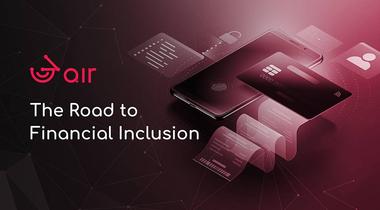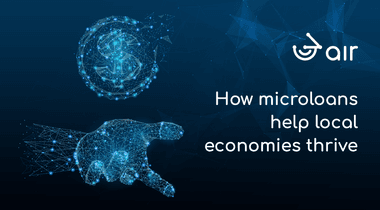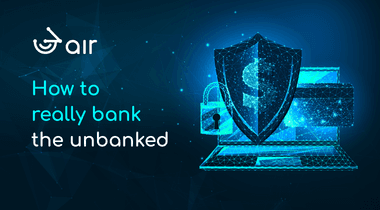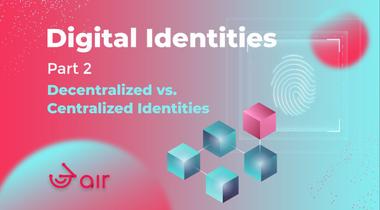Table Of Contents
In the last couple decades, we have made rapid technological progress. Innovative solutions change our daily lives so fast it almost seems impossible to imagine a time where those inventions haven’t been around, for example, access to banking, owning mobile phones or, surfing and streaming on the internet.
Yet there still are many unbanked households in the world, with roughly 31 percent of the worldwide adult population not having access to banking services. In other words, there are around 1.7 billion adults who don’t have access to a bank account or basic payment services, let alone consider the possibility they could have access to credit, ask for loans, or think about financial savings.
Most unbanked populations belong to the lower-income communities in developing economies, representing a percentage of almost half the unbanked adults. In comparison, high-income OECD countries only have 6 percent of adults without any banking, which happens more by choice than by lack of access and information.
Financial institutions have a great opportunity to gain new customers. Technology companies are helping to find solutions and are developing new tools to simplify financial inclusion. But how can those tools sustainably be integrated into developing economies where wages are extremely low and still mainly paid in cash? And are those tools even usable to laymen who have never had access to traditional banking services?
Why are people unbanked?
Before a solution can be proposed, it is important to understand the problem. The Global Findex survey from 2017 gives us deep insight into the reasons why people remain without access to the financial services offered by traditional banks.
Over 60 percent responded with lack of money to open an account as the main reason to be unbanked, but only 5 percent of respondents cited it as the sole reason for not having a bank account. Despite being the most frequent answer, and therefore the main reason, on average more than two reasons were given to the question why people don’t use financial services.
Other commons reasons are:
- no need for an account at a financial institution;
- accounts to expansive;
- a family member already has an account at a financial institution;
- local conditions. For example, for 27 percent of adults in Sub-Saharan Africa the problem is the distance to a bank;
- lack of trust in financial institutions;
- very uncommon but yet relevant, cultural beliefs as religious reasons.
Solutions to provide financial inclusion
Banks are traditionally considered essential when it comes to bringing inclusive finance to large portions of the planet that are still unbanked today. The main focus of banks are digitalizing payments and formalizing savings. A great part of the unbanked populations receive their wages in cash. Through incentives and facilitation of basic payment services, governments and the private sector can encourage the access to banking services.
The implementation of blockchain networks could help to improve security, transparency, and efficiency of those payments. Since blockchains eliminate intermediaries, transactions can be made quicker and more efficiently.
Its unique structure secures total privacy and high safety while making and receiving payments. It would also help to reduce remittance transactions fees between banks on both national and international payments, or from financial service providers as money transfer operators. Yet, the challenge would remain in assuring unbanked individuals have access to a device that has the ability to run eWallets.
Another approach surges as a niche market of cryptocurrency-based financial services, Decentralized Finance (DeFi). Those digital token based platforms offer decentralized lending, trading, borrowing and yield farming, as well as profit making opportunities, and smart contracts.
Unfortunately, the most innovative tech and apps are not worth much if they cannot be accessed by the users who need them. Unbanked adults are often unconnected, which leads to an inability to use digital services in the first place.
3air provides everything needed for banking
While other companies are using blockchain technology to create tools for financial inclusion, 3air focuses on a wholesome solution with connectivity in mind.
One third of the global adult population does not have access to financial services. Yet there are still 3 billion people who cannot access banking nor blockchain services because they are not connected to the internet. That is why 3air makes connectivity a priority and uses proprietary technology to build broadband infrastructure, connecting billions to the internet and the 3air platform.
By establishing connection to the internet, 3air solves a fundamental problem which hinders a big part of the population to access all the life-enhancing blockchain services that are being developed. Besides creating educational opportunities, which can help solving the main cause of unbanked and underbanked households of not having enough income, 3air helps to generate multiple passive and active revenue streams.
In the end, financial inclusion cannot consist in merely creating financial infrastructures, it has to follow the purpose of creating financial health. And once that is given, providing access to banking technology via the use of crypto, credit cards, bank transfers or cash to access decentralized lending, borrowing and yield farming will become accessible and attractive to any business or individual.










